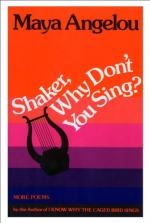|
This section contains 252 words (approx. 1 page at 400 words per page) |

|
Natural Landscapes
The natural landscapes in the poem are associated with the free bird and how he travels through the world. He sees things like rivers, the sun, the sky, and the trees. The free bird is able to explore and delight in the world around him, and Angelou paints a pleasant and energetic portrait of this world, saying, "The free bird thinks of another breeze / and the trade winds soft through the sighing trees / and the fat worms waiting on the dawn bright lawn / and he names the sky his own" (22-25). The landscape is wholly open to the free bird's imagination, and he is even able to "claim" the sky for himself. This world, the poem suggests, is the ideal world—the world of opportunity from which so many are excluded.
The Cage
The cage is presented as the opposite of the natural landscapes, as it is...
|
This section contains 252 words (approx. 1 page at 400 words per page) |

|




